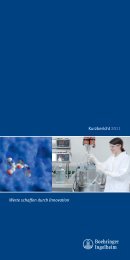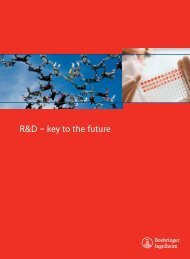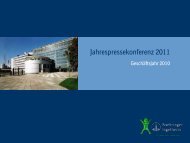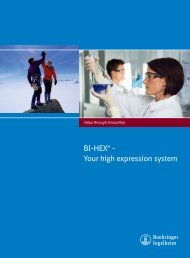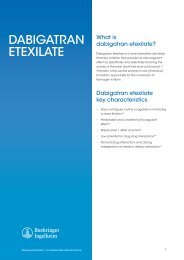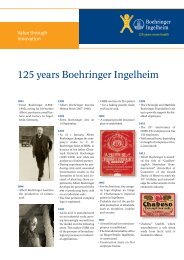RE-COVER⢠Study - Boehringer Ingelheim
RE-COVER⢠Study - Boehringer Ingelheim
RE-COVER⢠Study - Boehringer Ingelheim
Create successful ePaper yourself
Turn your PDF publications into a flip-book with our unique Google optimized e-Paper software.
<strong>RE</strong>-COVER <br />
<strong>Study</strong><br />
Background information – For medical media outside the US only<br />
KEy SuMMARy<br />
• The first results from <strong>RE</strong>-COVER show that<br />
dabigatran etexilate is as effective as wellcontrolled<br />
warfarin in the reduction of recurrent<br />
venous thromboembolism (VTE) and deaths<br />
related to VTE1 • Dabigatran etexilate demonstrated a significant<br />
37% reduction in major or clinically relevant<br />
bleeding, was comparable with warfarin in<br />
major bleeds and showed a significant 29%<br />
reduction in any bleeding compared with wellcontrolled<br />
warfarin1 • The benefits demonstrated in efficacy and safety<br />
with dabigatran etexilate occurred without any<br />
evidence of liver toxicity1 • <strong>RE</strong>-COVERTM is part of the most advanced trial<br />
programme of a novel oral anticoagulant in<br />
clinical development for treatment of acute VTE1 • Unlike warfarin, dabigatran etexilate provides<br />
predictable and consistent anticoagulant<br />
effects with a low potential for drug interactions,<br />
no food interactions, and no requirement for<br />
routine coagulation monitoring.<br />
1
<strong>RE</strong>-COVER <strong>Study</strong><br />
<strong>Study</strong> background<br />
• Well controlled vitamin K antagonist (VKA) therapy (such as warfarin) is highly effective in the treatment<br />
of acute venous thromboembolism (VTE) following initial treatment with a fast-acting anticoagulant. 2<br />
However,VKAs have several limitations which make maintaining patients within the narrow therapeutic<br />
range of INR* 2.0-3.0 difficult and inconvenient for clinicians and patients, including slow onset and<br />
offset of action, the need for routine coagulation monitoring and dose adjustment, and numerous food<br />
and drug interactions.<br />
• Even with close monitoring in a clinical trial, patients receiving warfarin only spend half their time within<br />
this narrow therapeutic range, and INR control tends to be even lower in clinical practice. 3<br />
Primary objective:<br />
• To demonstrate that the novel oral direct thrombin inhibitor dabigatran etexilate is as effective and safe<br />
as well controlled warfarin therapy for the treatment of acute VTE. 1<br />
<strong>Study</strong> design<br />
<strong>RE</strong>-COVER is part of the most advanced trial programme of a novel oral anticoagulant in clinical<br />
development for treatment of acute VTE1 • It is a phase III, randomised, double blind, parallel-group study 1<br />
• It involved 2,539 patients in 228 centres, in 29 countries 1<br />
• All patients received initial treatment (5-10 days) with a parenteral anticoagulant (low molecular weight<br />
heparin or unfractionated heparin) in line with current guidelines and well-established therapy1 • Patients were randomised to oral dabigatran etexilate, administered at a fixed dose of 150 mg twicedaily,<br />
or dose-adjusted warfarin (to maintain an INR of 2.0-3.0) 1<br />
• Treatment was given for six months. 1<br />
Objective<br />
confirmation<br />
of VTE*<br />
ENROLMENT<br />
≤72 h<br />
† Until INR ≥ 2.0 At Two Consecutive Measurements (5–10 Days)<br />
*Venous thromboembolism<br />
<strong>RE</strong>-COVER results<br />
<strong>RE</strong>-COVER demonstrated that dabigatran etexilate is as effective as warfarin in the treatment of VTE, with<br />
significantly less bleeding, no evidence of liver toxicity and with predictable and consistent anticoagulant<br />
effects. It has a low potential for drug interactions, no food interactions, and no requirement for routine<br />
anticoagulant monitoring. 1<br />
* International normalized ratio<br />
Initial parenteral therapy<br />
Background information – For medical media outside the US only<br />
6 months<br />
Single dummy period Double dummy period<br />
Warfarin<br />
placebo<br />
n=1274<br />
Warfarin<br />
n=1265<br />
Dabigatran etexilate<br />
Warfarin placebo<br />
Dabigatran etexilate placebo<br />
Warfarin<br />
30 days<br />
†<br />
RANDOMISATION END OF T<strong>RE</strong>ATMENT FOLLOW UP<br />
2
<strong>RE</strong>-COVER <strong>Study</strong><br />
Results: Safety endpoints<br />
• Dabigatran etexilate demonstrated significantly lower bleeding compared with warfarin 1<br />
− 37% reduction in major or clinically relevant bleeding (p=0.002)<br />
− 29% reduction in any bleeding (p=0.0002)<br />
• Major bleeding was comparable between dabigatran etexilate (20 patients, 1.6%) and warfarin (24<br />
patients, 1.9%) groups<br />
• Death, acute coronary syndromes and liver function abnormalities were low and similar in all treatment<br />
groups. 1<br />
Efficacy endpoints<br />
• Dabigatran etexilate is as efficacious as warfarin in the reduction of recurrent VTE and deaths related to<br />
VTE (p



